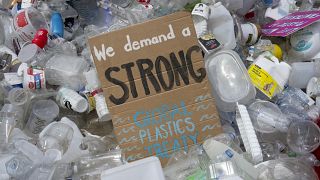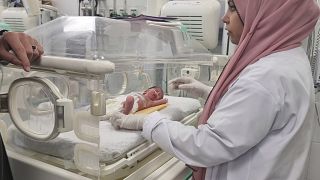Kenya
Could plastic waste fuel your car? One Kenyan entrepreneur is doing just that.
James Muritu and his company Progreen Innovations Limited is turning plastic waste into fuel to power cars and engines of every kind.
By heating plastic at very high temperatures in the absence of oxygen - a process known as pyrolysis -, Muritu turns the waste back into an oil or hydrocarbon liquid.
One of the by-products of this process is biochar which is then used to fuel the furnaces.
"We produce two kinds of alternative fuel, the first fuel is alternative petrol [which] is used for small to medium-sized machines. For the alternative diesel fuel that's usable by heavy-duty diesel engines: generators, it's used by vehicles as well, in my own vehicle, that's what I use," Muritu says.
A growing problem
With plastic waste a growing problem across the world, the Progreen Innovations project is timely.
Global waste production amounts to 400 million tonnes a year, according to the United Nations Environment Programme.
Only 12% of that waste is incinerated, and 9% recycled.
The waste that ends up in landfills or in nature will take hundreds of years to decompose, if at all, due to their tough and durable chemical structures.
Innovative solutions
Nickson Otieno, a local climate change expert and sustainability consultant, says Muritu's innovation is a step in the right direction.
"The most carbon-effective way of dealing with plastic waste is not to produce plastic at all. So we need to innovate to find alternatives to plastics," Otieno says. "But while we have the plastics; the ones that we have already produced, we need to explore all options. And I think pyrolysis and low-tech locally produced processes like the one the innovator has come up with, should be encouraged."
Toxic gases
Otieno says that the majority of the toxic gases produced through the pyrolysis reaction are redirected back into the process.
"There is valid concern about harmful gasses that are released through the pyrolysis process. But people need to know the difference between pyrolysis and incineration. Incineration is burning in process of air, Pyrolysis is burning in an enclosed system," Otieno explains. "So, by itself already there is a limited amount of toxic gasses that are released. But those toxic gases even though there are released, there are now technologies that can help harness those gases or actually purify them."
Not for sale - for now
Muriti's fuel is not yet for sale, as he is still waiting on approval from the Kenya Bureau of Standards.
For now, Progreen Innovations is able to produce 1,000 litres of fuel every two to three days, with 80% of the plastic waste used converted to fuel.
This means that for every 300 kilograms (660 pounds) of plastics put in the reactor, 240 litres (50 gallons) of fuel comes out of it.













01:02
Pics of the day: April 25, 2024
01:35
Kenya: Local anti malaria drug production signals progress
01:02
Pics of the day: April 24, 2024
01:40
Nairobi residents grapple with floods aftermath
02:29
"Efficient food systems key to tackling food waste", UNEP programme manager
01:02
Pics of the day: April 23, 2024